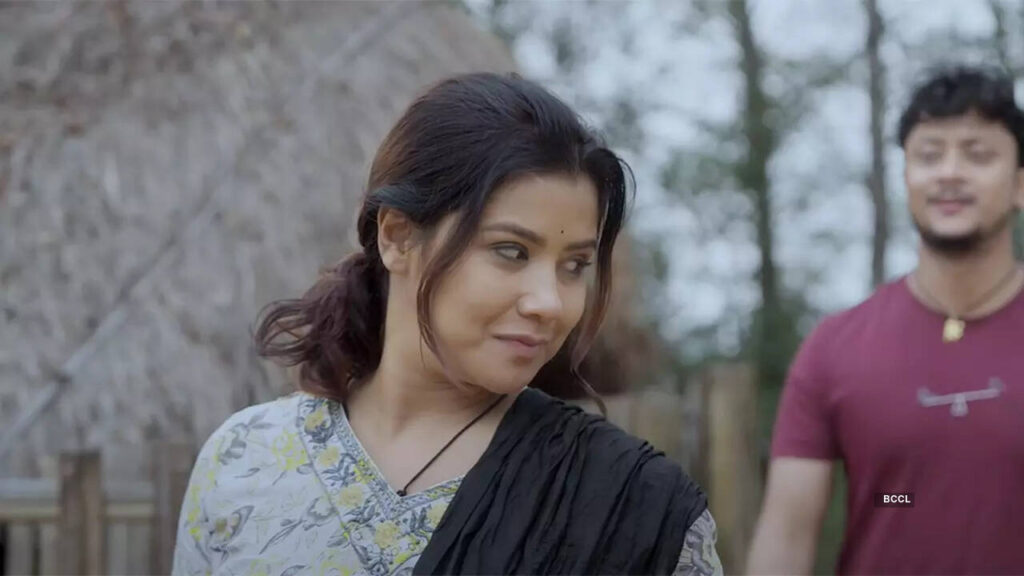Dhanjit Das’s latest Assamese film, Casetu Nagen (The Case is Nagen), explores how a desire to get rich quickly can lead one into a web of deception and consequences he/she never imagined. While on paper it promises a timely and thought-provoking tale, the leap from script to screen results in a film that is a bit of a letdown
Set in the fictional village of Kachubari, Casetu Nagen follows the story of Mahajon (Siddhartha Mukherjee), a well-meaning but gullible villager, who, during his youth, falls prey to a fraudulent money scheme known as the ‘dollar business’. Tempted by the promise of doubling his money with minimal effort, he persuades the other villagers to invest as well. But the scheme turns out to be a scam. The agents vanish, and the entire village is left in financial ruin, with Mohajon bearing the brunt of the blame. Their lives spiral into hardship as they are forced to mortgage their lands to a local loan shark. Years later, just as the villagers begin to rebuild their lives, a mysterious stranger (Himanshu Prasad Das) arrives with a suitcase full of cash, searching for someone named Nagen. But no one in the village knows anyone by that name. What follows is a chaotic and often absurd scramble, as villagers compete with each other to prove that they are the Nagen the stranger is looking for.
Casetu Nagen is, at its core, a fable about greed, blind hope, and the eternal temptation of easy money. It is a cautionary tale where the desire to earn quick money without effort leads only to repeated ruin. The villagers of Kachubari, having already been duped once, are quick to leap at yet another tantalising opportunity, proving that lessons learned the hard way are often not learned at all. The thematic premise holds undeniable promise. The film opens with a voiceover introducing us to the key players and the rhythms of village life. But good intentions and interesting ideas alone do not make a good film. Execution is key, and this is where the film begins to falter. Within minutes, we’re thrust into a slow-motion action sequence, followed by attempts at slapstick comedy that fall flat, a stock villain in the form of a conniving landlord, and a hastily drawn romance between two young characters. The result is a tonal mishmash – less a cohesive narrative than a checklist of crowd-pleasing elements, stitched together in a way that ultimately feels forced and unconvincing.
One of the key issues with Casetu Nagen lies in its overcrowded ensemble. There are too many characters, and none of them are given the space to develop a meaningful arc. The film throws so many faces at us that it starts to feel less like a character-driven narrative and more like a casting roll call. At times, we sense that the material might have fared better as a web series, where these individuals could be given room to breathe. Instead, we’re treated to large, chaotic village meetings that aim for comedy but land in contrivance with moments that feel designed more to fill runtime than to serve the story.
The plot itself lacks shape. Scenes come and go with little narrative momentum, and too often the direction feels hesitant, as if we’re watching a rehearsal rather than a final take. The mysterious visitor, meant to drive the tale, never quite lands as a compelling presence. Rather than drawing us in, his quest to find Nagen feels like a half-hearted device, stretched thin over an already flagging structure. By the time the interval twist rolls around, we return from our snack break expecting a tonal or narrative shift, only to be met with more of the same drag. And then there’s the climax: a chaotic, slapstick-style free-for-all over a suitcase of money that feels oddly reminiscent of a Priyadarshan comedy without the timing, the craft, or the fun. It’s an ending that wants to be farcical, but lands closer to far-fetched, leaving us more exhausted than entertained.
Himanshu Prasad Das delivers the film’s most grounded performance, offering a quiet charm and sincerity that help steer it away from outright melodrama. He strikes the right balance between innocence and not being entirely naïve. Tapan Das, as the recurring Sutradhar, brings authority to his role. Pranami Bora, an actress of calibre, struggles with the comedy here. Her loud delivery and exaggerated tone fall flat, despite the occasional effectiveness of her Bodo accent. Siddhartha Mukherjee adds warmth as Mahajan, but like much of the ensemble, suffers from thin characterisation. The rest of the cast lean too heavily into theatrics, pushing the film further into uneven territory.
Chandra Kumar Das’s cinematography captures the rural setting with a certain rustic flavor, but never rises above the functional. Uddipta Kumar Bhattacharyya’s editing faces an uphill battle against a sluggish screenplay, and despite best efforts, the pacing drags more than it flows. Pallab Talukdar’s background score sits well enough within the film’s world, but the songs feel wedged in, particularly the end-credits number.
Das made an impressive debut with Xobdo Nixobdo Kolahol (2022), a modestly budgeted anthology that hinted at a fresh new voice in Assamese cinema. But with his follow-up films, he seems more concerned with playing to the gallery. I hope he returns to the quiet confidence of his earlier work in the future rather than trading nuance for noise and promise for populism.
Assamese, Comedy, Drama, Color


